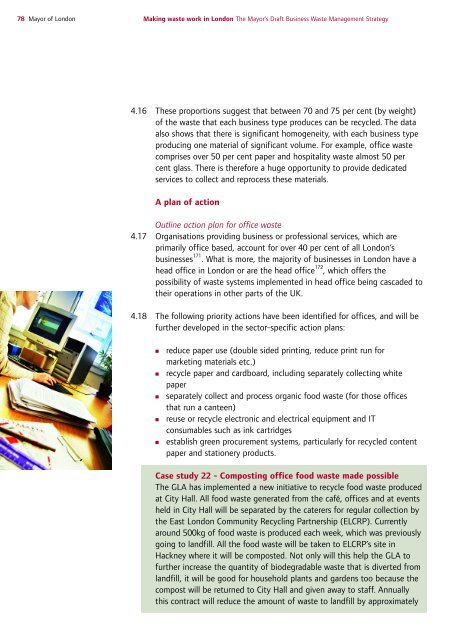Draft Business Waste Strategy PDF - london.gov.uk - Greater ...
Draft Business Waste Strategy PDF - london.gov.uk - Greater ...
Draft Business Waste Strategy PDF - london.gov.uk - Greater ...
Create successful ePaper yourself
Turn your PDF publications into a flip-book with our unique Google optimized e-Paper software.
78 Mayor of London<br />
Making waste work in London The Mayor’s <strong>Draft</strong> <strong>Business</strong> <strong>Waste</strong> Management <strong>Strategy</strong><br />
4.16 These proportions suggest that between 70 and 75 per cent (by weight)<br />
of the waste that each business type produces can be recycled. The data<br />
also shows that there is significant homogeneity, with each business type<br />
producing one material of significant volume. For example, office waste<br />
comprises over 50 per cent paper and hospitality waste almost 50 per<br />
cent glass. There is therefore a huge opportunity to provide dedicated<br />
services to collect and reprocess these materials.<br />
A plan of action<br />
Outline action plan for office waste<br />
4.17 Organisations providing business or professional services, which are<br />
primarily office based, account for over 40 per cent of all London’s<br />
businesses 171 . What is more, the majority of businesses in London have a<br />
head office in London or are the head office 172 , which offers the<br />
possibility of waste systems implemented in head office being cascaded to<br />
their operations in other parts of the UK.<br />
4.18 The following priority actions have been identified for offices, and will be<br />
further developed in the sector-specific action plans:<br />
■ reduce paper use (double sided printing, reduce print run for<br />
marketing materials etc.)<br />
■ recycle paper and cardboard, including separately collecting white<br />
paper<br />
■ separately collect and process organic food waste (for those offices<br />
that run a canteen)<br />
■ reuse or recycle electronic and electrical equipment and IT<br />
consumables such as ink cartridges<br />
■ establish green procurement systems, particularly for recycled content<br />
paper and stationery products.<br />
Case study 22 - Composting office food waste made possible<br />
The GLA has implemented a new initiative to recycle food waste produced<br />
at City Hall. All food waste generated from the café, offices and at events<br />
held in City Hall will be separated by the caterers for regular collection by<br />
the East London Community Recycling Partnership (ELCRP). Currently<br />
around 500kg of food waste is produced each week, which was previously<br />
going to landfill. All the food waste will be taken to ELCRP’s site in<br />
Hackney where it will be composted. Not only will this help the GLA to<br />
further increase the quantity of biodegradable waste that is diverted from<br />
landfill, it will be good for household plants and gardens too because the<br />
compost will be returned to City Hall and given away to staff. Annually<br />
this contract will reduce the amount of waste to landfill by approximately
















